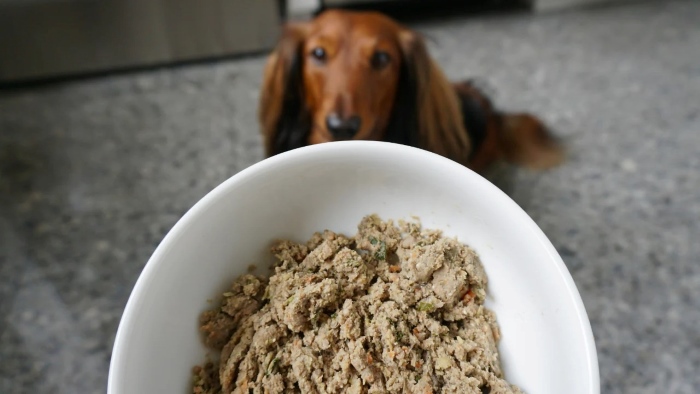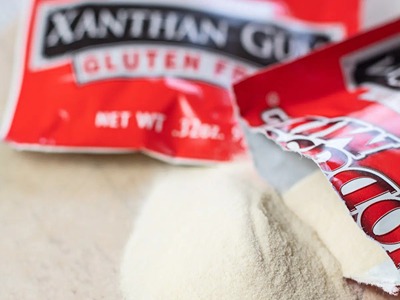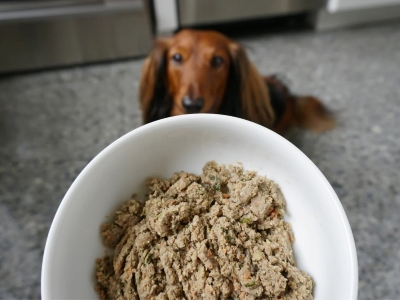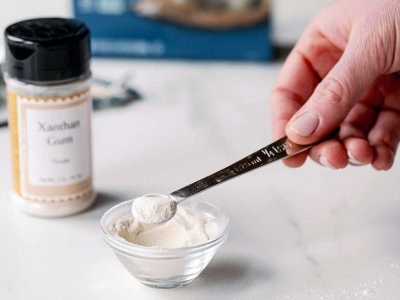As responsible pet owners, we’re often curious about what’s safe to share with our furry companions.

Xanthan gum, a common food additive found in various human foods, is one such ingredient that might make you wonder whether it’s safe for dogs.
In this article, we’ll dive into the world of xanthan gum, its uses, potential benefits, and, most importantly, whether it’s safe to include in your canine friend’s diet.
Contents
What Is Xanthan Gum?
A bacterium known as Xanthomonas campestris and sugar are used to ferment sucrose to create xanthan gum.
Following pasteurization, filtration, and drying, the final combination is transformed into a white powder that is simple to combine with liquids[1].

Xanthan gum is a versatile and often–used addition in several sectors because of its capacity to thicken, stabilize, and emulsify liquids.
Many goods, including salad dressings, ice creams, toothpastes, paints, and even toilet cleaners, contain xanthan gum.
Why Is Xanthan Gum Used in Dog Food?
Xanthan gum is primarily used as a thickener and stabilizer in wet or canned dog food[2]. It offers the cuisine a creamy and moist texture and aids in preventing the separation of the ingredients.
By stopping bacterial development, it also contributes to a longer food shelf life. In dog food, xanthan gum is regarded as an addition rather than a primary component.

It serves only to make the meal seem appetizing and tasty; it does not offer much nutritional benefit to your dog. However, the owners profit more than the dogs do from this consequence.
Dogs aren’t really concerned about the appearance of the meal; they rely on the smell and taste to decide if they want to eat it or not.
Is Xanthan Gum Safe for Dogs?
According to most veterinarians and dog experts, xanthan gum is safe for dogs when consumed in moderation.
There have not been any extensive studies on the safety of xanthan gum for dogs, but given its widespread use in dog foods, there have not been any reports of serious problems or adverse effects caused by it either.
Xanthan gum can cause some digestive issues, such as stomach upset, diarrhea, or vomiting, if consumed in large amounts[3].

Be that as it may, it is usually impossible for this to happen unless your canine eats immaculate xanthan gum or a tremendous amount of nourishment that contains it.
Xanthan gum does not have a wonderful taste, so your pooch will likely not be enticed to eat it by itself.
On the off chance that your pooch does ingest immaculate xanthan gum or as much nourishment that contains it, they will likely recover once it passes through their framework.
Be that as it may, you ought to screen your dog’s condition and counsel your veterinarian on the off chance that you take note of any signs of trouble or distress, such as continuous heaving or the runs, blood within the stool or upchuck, shortcoming, or collapse[4].
Does Xanthan Gum Have Any Benefits for Dogs?
Xanthan gum may have some benefits for dogs, especially diabetic dogs. Xanthan gum can help lower blood sugar levels by slowing down the digestion and absorption of carbohydrates.
This can also help lower cholesterol levels and promote weight loss by creating a feeling of fullness in the stomach. However, these effects are not very significant and depend on the amount and type of carbohydrates in the diet.

Therefore, xanthan gum should not be used as a substitute for a proper diet and medication for diabetic dogs.
You should always consult your veterinarian before making any changes to your dog’s diet or treatment plan.
How Much Xanthan Gum Is Safe for Dogs?
How much xanthan gum is safe for dogs is a question that has no clear solution. Depending on the brand and kind of food, different amounts of xanthan gum are added to dog meals.
Generally speaking, the weight of wet or canned dog meals contains less than 1% xanthan gum.

To reach a hazardous level, your dog would need to consume more than 100 grams of xanthan gum for every kilogram of body weight.
For a dog weighing 10 kilos, this is the equivalent of consuming more than 10 kilograms of wet or canned dog food. This is both unrealistic and exceedingly implausible.
Therefore, you should not be concerned about xanthan gum damaging your dog as long as you provide them with a balanced and adequate amount of food that fits their nutritional demands.
FAQs
Can I add xanthan gum to my dog’s food to improve its texture?
Yes, you can use xanthan gum to modify the texture of your dog’s food, especially if they have dental issues or difficulty chewing. Start with a small amount and gradually increase if needed, while closely monitoring your dog’s response.
Can dogs be allergic to xanthan gum?
Yes, just like humans, dogs can develop allergies or sensitivities to certain ingredients, including xanthan gum. Introduce it cautiously and watch for any adverse reactions.
Can xanthan gum be used for puppies?
Puppies have sensitive digestive systems, and introducing new ingredients should be done cautiously. Consult your veterinarian before adding xanthan gum to a puppy’s diet.
Is xanthan gum found in commercial dog foods?
In commercial dog meals, xanthan gum is occasionally employed as a thickening agent. If you’re worried, it’s a good idea to examine the ingredient list because its presence and amount might fluctuate.
Is there any alternative to xanthan gum for modifying texture in dog food?
Natural solutions like mashed and cooked veggies should be taken into consideration if you’re seeking for alternatives to change texture. Before making any dietary modifications for your dog, always check with your veterinarian.
Conclusion
In the world of pet nutrition, knowledge is power.
While xanthan gum can be safely consumed by dogs in small amounts, responsible pet ownership involves being informed and cautious.
If you’re considering adding xanthan gum to your dog’s diet, start with moderation, monitor their response, and consult your veterinarian for guidance.
Remember, a balanced and wholesome diet tailored to your dog’s specific needs is the key to their well-being.
Reference:
- XANTHAN GUM: Overview, uses, side effects, precautions, interactions, dosing and reviews | WebMD
- Dog Food – Pulses Ingredients | Michigan State University
- Digestive Disorders of Dogs | MSD Vet Manual
- When To See A Veterinarian For A Dog’s Stomach Ache | VMBS News

Dania is a dog groomer living in California, who loves styling dogs. She often uses dog accessories to keep them distracted while grooming. She is also a dog parent to a Pomeranian, Duke. It’s because of him she is always on a lookout for the best dog foods, toys, other dog accessories, and ways to keep him equipped, healthy and happy.

